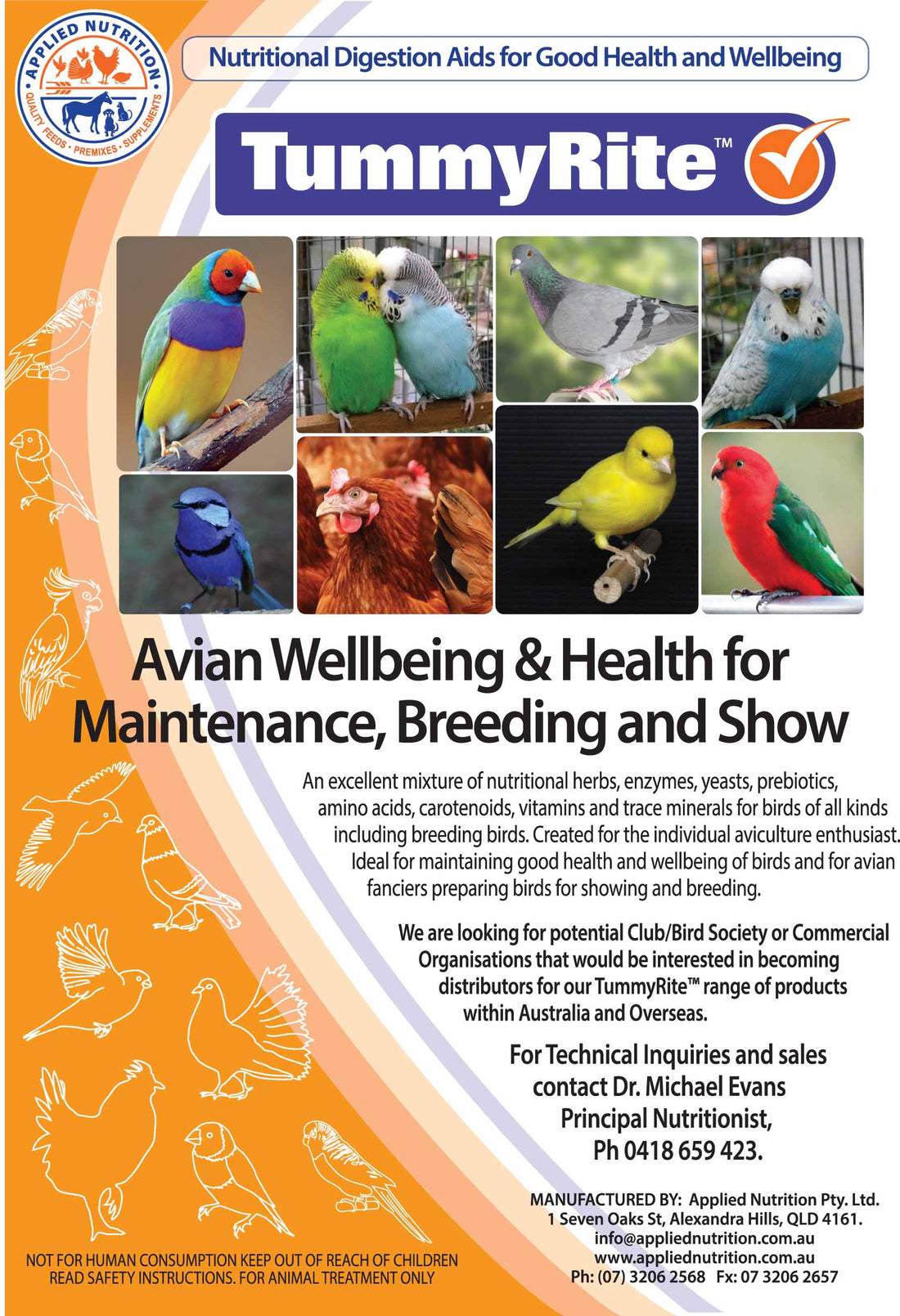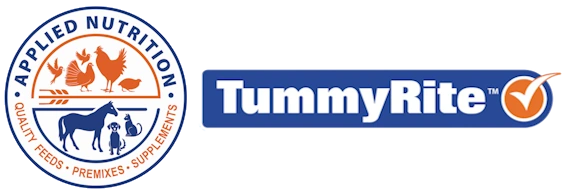
SEED-BASED BIRD FOOD, GOOD OR BAD FOR MY BIRDS?
There are two aspects to this discussion related to the feeding of birds:
- Is the bird food I am giving my birds providing them with all the nutrients they need, daily, to them allow them to survive, grow or breed?
- Is the form of the bird food delivered to the birds appropriate and essential?
Seed alone or any other single feed ingredient cannot provide the complete daily nutrient requirements for birds, even at maintenance. Maintenance is the physiological state requiring minimal nutrient requirements to maintain the bird in good health and providing sufficient nutrients for body tissue and feather replacement. The reason for this is that the nutrient composition of the seeds or ingredients offered to the birds does not marry up with the actual daily nutrient requirements of the bird.
A classic example of this is calcium. Laboratory analyses of individual seeds have shown that all are grossly deficient in calcium and do not come even close to meeting the bird’s daily requirement. The feeding of a low calcium food over time results in skeletal and muscular problems, blood clotting problems, and for breeding birds, severe conditions such as egg binding are more likely to occur. There are many other nutrients in seed grains that are deficient and equally important as calcium. These nutrients include the essential amino acids, methionine, and cystine, necessary for feather growth and development; Lysine, threonine, and isoleucine are critical for growth in young growing birds. Even birds at maintenance need the correct balance of nutrients to ensure proper body tissue and feather replacement. Many of the vitamins and trace minerals are deficient in many of the seeds we feed to our birds. To name one, selenium which is lacking in many of our soils is grossly inadequate in many of our seed grain crops. Selenium, in conjunction with vitamin E, is essential for successful breeding in birds.
The question is, how do I achieve this supplementation or balancing of the seed mixtures? Can I add a supplement mixture to my seed or should I feed a crumble or pellet as a complete food?
The answer lies in the gastrointestinal (GIT) function and the function the proventriculus and gizzard play in food digestion and health benefits. In particular, I want to talk about the gizzard function and its importance in birds. The commercial Poultry Industry, both egg, and chicken meat production, have learned lessons the hard way, and in recent years there is a move back to feeding coarser particle size diets for laying birds in the Egg Industry, and the Chicken Meat Industry is now adding whole grain to their feed mixtures with pellet and crumbles. Why? Simple answer, proper gizzard development, and function are essential, not only as a grinding organ but in maintaining GIT motility. For the Commercial Poultry Industry, this meant reduced mortality, improved health and well being, including improved coccidiosis control, improvements in growth, feed conversion and bird performance. In the Aviculture Industry, we are more concerned about bird health, survival and breeding via good nutritional practice. GIT motility is critical to feed intake, feed flow and nutrient digestion and utilisation but also plays a crucial role in the health of the bird dealing with pathogen and parasites such as coccidiosis (see later).
Researchers, including myself, have shown that the feeding of whole-grain or coarse insoluble fibres to poultry significantly increased gizzard size and muscularity and reduced the pH of the gizzard contents by 0.2 to 1.2 units (remember pH is a log scale). The muscular movements of the gizzard facilitate the mixing of the food materials with hydrochloric acid and pepsinogen secreted by the proventriculus acts mostly on food in the gizzard and is vital for food digestion. This reduction in the pH in the gizzard caused by the hydrochloric acid from the proventriculus has health benefits due to its anti-microbial effects. The muscular motility of the gizzard increases the duodenal back reflux into the gizzard facilitating the mixing of bile acids and emulsifiers for fat digestion. Bile acids are very anti-microbial and therefore, a potential health benefit.
In an experiment, I conducted many years ago at the Poultry Research Centre in Queensland, with seventy-week old laying hens that had been on a fine-grind mash diet all their life, I replaced the ground-grain component with whole-grain. The same formulation, the only difference between the foods was the physical form of the grain. There was no difference in performance parameters; however, a sample of birds from each treatment group where placed in metabolism cages and challenged with a coccidiostat vaccine. The birds fed the whole-grain group showed a 2.5 times reduction in oocyst output than birds fed on the finely ground diets. This simple experiment clearly showed significant health benefits to the birds in controlling coccidiosis challenges by feeding diets based on whole seed grains.
After doing a full analysis of the majority of seeds available to birds in captivity, I have calculated that a mixture of whole grains can provide many of the nutrients required by the birds with a small amount of supplementation with critical nutrients to plug the deficiency gaps in this whole-grain seed mixture. I have spent much time researching the nutrient requirements of various bird species (finches, budgerigars, parrots, canaries, pigeons, poultry) in different physiological states, i.e. maintenance, feather replacement during the moult, breeding, growth and development and health.
Based on this research and based on the laboratory analyses of the seeds fed to birds in captivity I have developed a range of products known as the TummyRite™ and TummyRite™ Plus products when added to seed-mixes at 20g/kg seed and 50g/kg seed respectively balance the deficiencies in the seed mixes. These supplements are coated on the outside of grain using a small amount of vegetable oil (sunflower oil, soybean oil or hemp oil are suitable). For details on how to do this see my blog on “A Complete Bird Food by adding TummyRite™ Avian Supplements to Dry and Soaked Seed” at https://tummyrite.com.au/blogs/technical/a-complete-bird-food-by-adding-tummyrite-avian-supplements-to-dry-and-soaked-seed. This discusses the method, I use to coat the seed grain with the TummyRite™ supplements.
Field experience and feedback from many bird keepers of various species (finches, budgerigars, parrots, canaries, pigeons, poultry) over the last five years (since 2015) has shown significant improvements in tissue and feather condition as well as overall bird health and well being and increased breeding success.
TAKE HOME MESSAGES:
1. Whole grain is best for birds, and birds with their functional gizzard need and are very capable of digesting large seed grain particles. In the wild, birds are very capable of handling a wide variety of seeds and seed sizes.
2. Whole seed grain promotes a well developed and function gizzard which has both nutritional and health benefits for captive birds if appropriately supplemented.
3. Bird keepers should be wary of trusting exclusively in crumbles or pellets as the sole diet fed to your birds as these type of products come from finely ground ingredients before pelleting and do not encourage proper gizzard development. However, these type of products can be fed as a supplement to whole-grains on the condition they balance the nutrient composition of the whole seed grains fed and meet the bird’s nutrient requirements.
4. Do not rely solely on a single seed, mainly those high in oil to provide nutrition for your birds, use a blend of seeds with a suitable supplement balancer to fill the nutritional gaps in the seed mix.
5. The use of scientifically formulated supplements for whole-grain diets are critical to the nutrition and the health and well being of captive birds in our care. TummyRite and TummyRite Plus are suitable balancers for your seed mixes.
